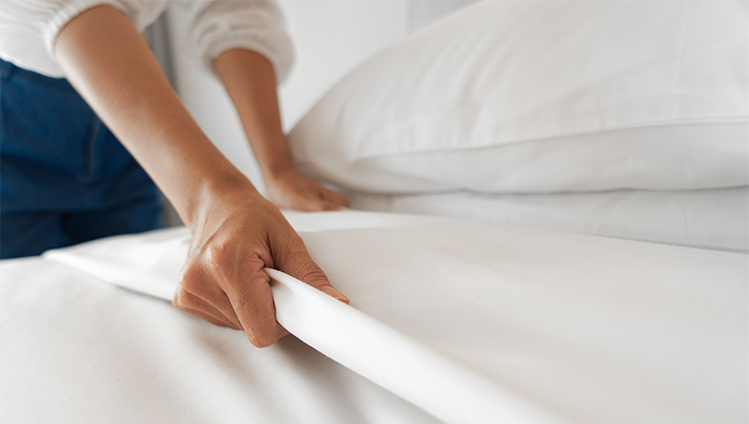A fashionably furnished lobby, friendly service, and a restaurant offering the most exquisite food – so begins a promising holiday in a hotel. But the moment the guest arrives in the room a stain is visible in the middle of the pillow. There’s no quicker way to spoil the good mood of a hotel guest.

Hygienically clean hotel linens are a basic requirement for the well-being of guests. Whether it’s cloth napkins on the tables, towels and terry cloth robes in the bathroom and spa area, or duvets and pillow covers. According to the Foodservice Consultant Society International, for nine out of ten customers, clean laundry is one of the most important quality criteria when choosing a hotel, even before the location, WiFi or catering. Yet another reason why more and more hoteliers are leaving cleaning in the hands of professionals. This is because commercial large-scale laundries have high- spec equipment and can clean to particularly high standards in their large tunnel washers. But what do our press cushions have to do with cleaning pillow cases?
Dewatering presses remove moisture from the laundry before drying
Before the final process of cleaning, but still wet, the laundry is sent to the dryer. It is prepared in cyclic dewatering presses. This process removes up to 70 percent of its moisture. The downstream dryers are only required to evaporate a fraction of the original amount of water. This saves time and energy, and reduces wear on the machines.
This is where our rubber press cushions come into play. They are attached to the underside of the hydraulic stamps which create the pressure. The water-filled pads allow for an even distribution of pressure, while at the same time caring for the fabric of the textiles. During the dewatering process, they first protect the laundry from mechanical damage by the press stamp. Secondly, the elastic deformability of the elastomer material adapts the press cushion to the distribution of the laundry in the compacter, thereby improving drainage performance – leading to gentle and efficient drying.
Lavatec Laundry Technology GmbH builds systems for fully-automatic laundries and relies on our press cushions. “Each individual component of a laundry system affects the overall performance of the system. All parts must be coordinated,” explains Arne Brunkhorst, Sales Manager for Vibration Insulation products at Continental. “To ensure this, we offer our customers different types of press cushions, with diameters from 729 mm to 1300 mm.”
 |
Arne Brunkhorst, Sales Manager for Vibration Insulation products at Continental:
“In industrial laundries, Lavatec’s machines are operating at full speed to provide the hotels with fresh laundry every day. You can always rely on our durable and gentle press cushions.” |
|
Extra durable: Our two-component press cushion
In addition to classic press cushions consisting of one component, we also have two-component press cushions in our product range. The highlight: In the high-friction flank area, a hard rubber compound with a hardness of Shore 80 is used, while the floor and flank area responsible for pressing is made from a softer compound. “Thanks to this blend of materials, the pad is very durable and provides even more effective dewatering after washing – while at the same time extending the life of the system,” says Brunkhorst.
Professional laundries that take the work out of hotels are in demand: The Delta Check project alone has covered almost 400,000 star hotels worldwide. It goes without saying that every new guest receives fresh laundry. Towels are replaced daily, if guests wish. It quickly adds up. Even an operation with just 60 beds has an average of 3,150 sets of bed and towels washed in one year, resulting in around 9,000 kilograms of laundry. But even that doesn’t make an in-house laundry worthwhile. Even much larger operations tend to shy away from that level of expenditure. That’s why it’s common in the industry to either hire in large laundries, or to rely on leased linen. And that in turn means a lot of work for our press cushions.